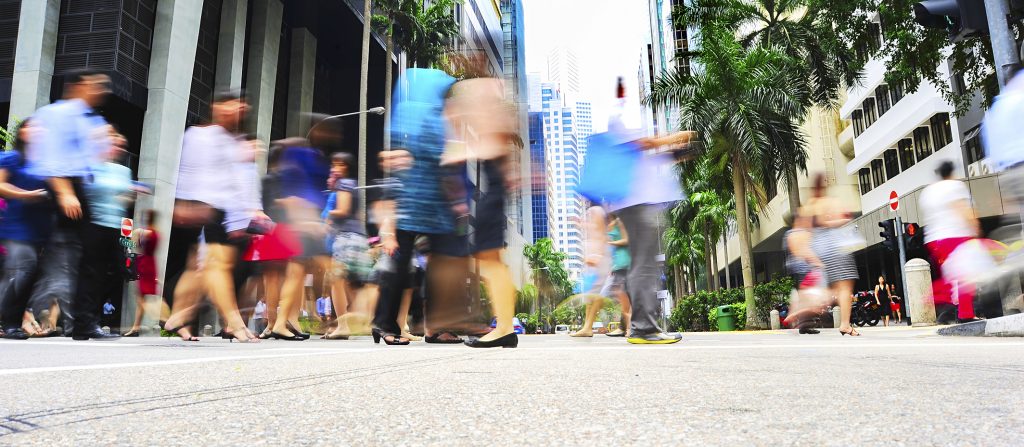
In Singapore, a recent survey indicates a decrease in overall happiness among residents over the past decade. However, a nuanced exploration of the findings reveals that individuals who strike a balance between family values, adherence to traditions, social and environmental concerns, alongside a moderate level of financial and social standing, tend to report higher life satisfaction.
According to a survey: Singaporeans are less happy but those who lead balanced lives are happier
The 2022 Quality of Life Survey, conducted every five years since 1996, engaged 1,905 Singaporeans aged 21 and older from June to July 2022. The respondents evaluated various aspects of their lives, including relationships, health, and the frequency of enjoying life. Intriguingly, the survey brings to light that those prioritizing material possessions and luxurious lifestyles, despite financial prosperity, emerge as the least content. This insightful exploration sheds light on the complex interplay of factors influencing happiness in contemporary Singapore.
Presented on January 11, the survey’s insights were shared by academics from the National University of Singapore Business School – featuring Associate Professor Tambyah Siok Kuan, honorary fellow Tan Soo Jiuan, and PhD candidate Yuen Wei Lun – encapsulated in a comprehensive book.

Researchers unveiled that individuals adopting a balanced life approach, valuing family, sustainability, tradition, and materialism in equal measure, emerged as the most satisfied group, constituting 30% of the respondents.
Following closely were those embodying a pro-social orientation, emphasizing family, societal well-being, and environmental concerns while minimizing the importance of materialism. This group accounted for nearly one-fifth of the survey participants. The survey’s nuanced findings provide valuable insights into the diverse factors shaping satisfaction levels in Singapore.
Next in line were individuals who placed a premium on family values and traditions, encompassing religious and conservative values, albeit with a lesser emphasis on sustainability. This subgroup constituted approximately one-third of the surveyed participants. The survey’s intricate revelations shed light on the varied perspectives and priorities that influence satisfaction levels among Singaporeans.

The least satisfied demographic encompassed individuals whose values centered around materialism, giving minimal importance to sustainability and traditionalism. This group constituted 17% of the total respondents.
The survey’s broader analysis revealed a decline in self-reported well-being among Singaporeans across all 15 measured life domains, including relationships, health, standard of living, and household income. Notably, scores had witnessed a decline from 2011 to 2016.
Examining specific life domains, participants expressed the highest satisfaction in their relationships with children, parents, and siblings. In contrast, the area generating the least satisfaction consistently across the last three surveys was household income. These nuanced findings provide a comprehensive understanding of the multifaceted aspects shaping well-being in Singapore.
Similar to previous surveys, higher levels of happiness were observed among men, married individuals, and those with elevated levels of education and income.
The survey unveiled a decline in people’s satisfaction with their democratic rights from 2011 to 2022, influencing their overall well-being. Across the six rights measured, respondents expressed the highest satisfaction with the right to vote, while the least satisfaction was associated with the right to criticize the Government. The other four rights included the right to participate in any organization, gather and demonstrate, be informed about government functions, and freedom of speech.
Despite the challenging aspects highlighted, the researchers emphasized a silver lining in the findings. Singaporeans, in general, expressed satisfaction with their lives, believing they have the essential elements for a fulfilling life.
Moreover, Singapore maintains a respectable position in the annual World Happiness Report, securing the 25th spot in the 2023 rankings, offering a broader context to the local well-being landscape.
The survey findings indicated that individuals who engage in acts of kindness and empathy tend to experience greater life enjoyment, along with a heightened sense of accomplishment and purpose. This highlights the potential for Singaporeans to enhance their happiness by participating in pro-social behaviors, such as volunteering.
Professor Tambyah emphasized that Singapore possesses key attributes conducive to a contented life, including a safe society, stable economy, and strong family relationships. Despite the discouraging results, she acknowledged that the 2022 survey coincided with the challenges of the Covid-19 pandemic, geopolitical tensions, and economic uncertainties.
Amidst the challenges, positive aspects, such as high satisfaction with familial relationships and the joy derived from pro-social activities, underscore the significance of a robust social and family fabric in fostering a cohesive, caring, and inclusive nation. Professor Tambyah encourages Singaporeans to cultivate a harmonious blend of values, trust, openness, and democratic processes, envisioning a collective effort to build a happy and fulfilled society.




